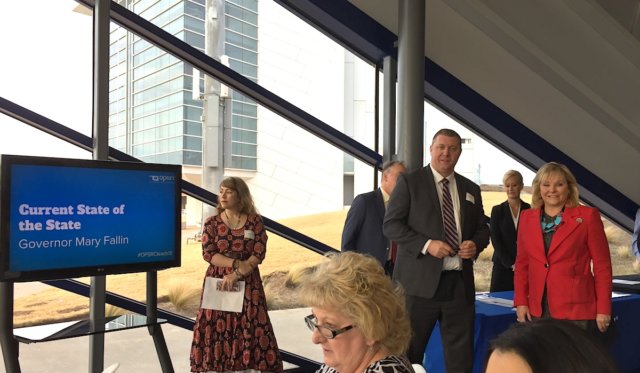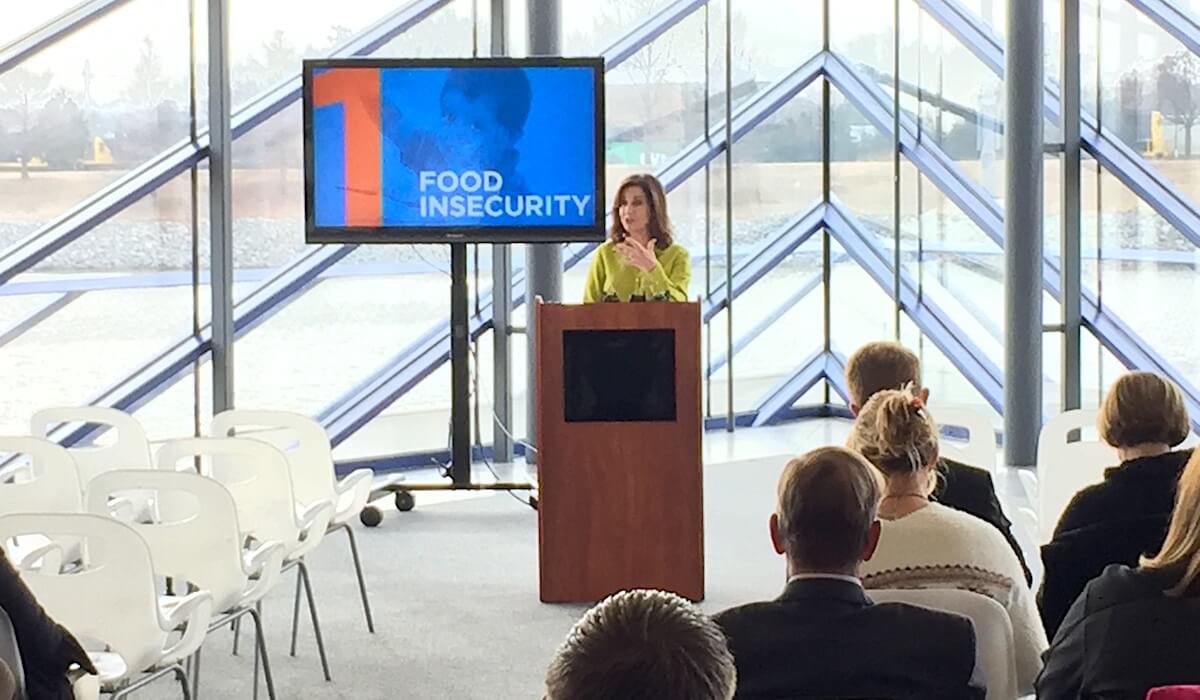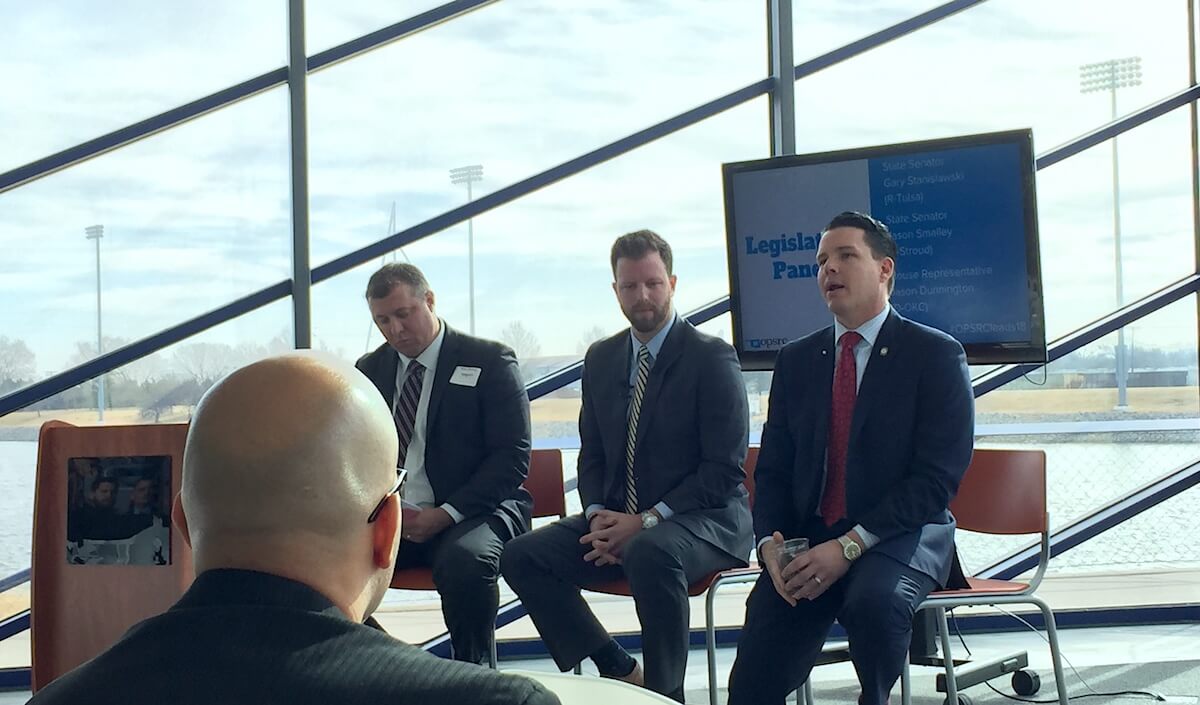

Gov. Mary Fallin gave the morning’s first speech at the Oklahoma Public Schools Resource Center‘s Superintendents’ Advisory Council today, telling the assembled education administrators that the state has to “stop kicking the can down the road” when it comes to public funding, particularly for a teacher pay raise.
“We want people to be able to find a good-paying job and be able to stay here in the state, we have to provide essential services, and education is (part of that),” Fallin said. “We have to think about what kind of state we want to be.”
Fallin’s rhetoric was not all that different from the message she’s pitched to the Legislature over the past two-plus years: Find a way to raise recurring revenue, find a way to raise teacher pay and find a way to ensure Oklahoma has the educated workforce it needs over the next decade.
“It’s hard for me to recruit businesses,” Fallin said. “I’ve been successful at it because I’m a pretty good salesperson when it comes to recruiting businesses, but it’s hard (when people read so many news stories about state-funding problems).”
‘As cliché as it might sound, we really are in this together’

Fallin’s sentiments were echoed and built upon by Oklahoma Superintendent of Public Instruction Joy Hofmeister. The state schools leader presented her Oklahoma Edge plan, which used a slew of unflattering state statistics to pitch three goals for the future of Oklahoma education:
- Achieve academic success for all kids.
- Build exceptional educators and schools.
- Create engaged communities.
“As cliché as it might sound, we really are in this together,” Hofmeister said. “There needs to be an increased focus in Oklahoma on the investment in education.”
Both Hofmeister and Fallin said Oklahoma is currently seeing more public effort toward education advocacy than it has in the past. To the detriment of advocates, however, both the Legislature and the voting public have rejected plans to stabilize or increase state funding for education.
Voters rejected State Question 744 in 2010, which would have mandated that education be funded at a per-pupil average of surrounding states. Only 18.6 percent of voters cast their ballots in favor.
Six years later, voters again defeated an increase in public education funding — State Question 779, which would have dedicated an additional $0.01 sales tax toward a $5,000 teacher pay raise, as well as other classroom dollars and higher education budgets. Only 40.6 percent of voters cast their ballots for SQ 779.
In the 2017 legislative session that followed, lawmakers on both sides of the aisle made raising teacher pay a verbal priority, but after hearings and votes that spanned eight months of the year, no agreement was reached.
“I think the public wants and will demand that our Legislature meet the needs of teachers, and it starts with competitive teacher pay,” Hofmeister said after her speech. “I won’t stop. I will not be quiet. I’m going to make sure we make this again the front issue on meeting the needs of kids. We can have the highest standards in the world, but if we don’t have the teachers to teach them, what good is it? This comes down to the most important step we can take right now, which is to address competitive teacher pay and send a message of respect to those in the profession and those who desire to make a difference.”
Asked whether the public deserves blame for not voting for teacher pay increases on the 2010 and 2016 ballots, Hofmeister said “no.”
“I disagree that there is any sentiment out there that is against a high-quality education. I think where there has been disagreement is on how that is funded,” Hofmeister said. “So that is not necessarily the role of state superintendent to determine. It is my job to articulate the need and forcefully argue that happens for kids.”
Fallin said she “always” supports the public getting to vote on policy proposals, and she said that education issues are even more prominent now than they were when voters rejected SQ 779.
“When we had a public vote on a state question to have an increase in the sales tax to fund a teacher pay raise, [voters] said no,” Fallin said. “But since that time, it’s taken so long for our economy to recover, and it’s been hard to get 75 percent of the Legislature to vote for revenue to pay our teachers more, I think everybody’s had a new awareness and a profound interest.”
OIPA: Increasing GPT ‘bad public policy’
Oklahomans may see another state question to raise teacher pay on their 2018 ballot. Language has been filed for State Question 795, which would add an additional 5 percent gross production tax on the first 36 months of oil and gas wells and then dedicate the money constitutionally to require a $4,000 pay increase for certified personnel in public school districts.
The effort is being led by a group of longtime oil and gas producers, but it is being opposed by larger industry groups. Wednesday morning, before Fallin, Hofmeister and others spoke to OPSRC members, the Oklahoma Independent Petroleum Association announced a legal challenge of SQ 795.
“Singling out one industry for a constitutionally enacted tax increase is not only unprecedented, it is bad public policy,” OIPA vice president of regulatory affairs A.J. Ferate said in a press release. “By setting such a precedent, this state question could open the door to placing similar tax increases in the constitution on other Oklahoma industries like agriculture, manufacturing or aerospace.”
Ferate is representing OIPA in the legal challenge, which argues that the ballot language as filed is “biased” and violates the state’s single-subject rule.
‘Always a shame if the public has to do a legislator’s job’

After Fallin and Hofmeister spoke Wednesday, Sen. Jason Smalley (R-Stroud) and Rep. Jason Dunnington (D-OKC) answered audience questions about education topics, including whether there will be proposals for school-district consolidation in the 2018 legislative session.
“We’ve got to debunk this message that it’s going to save money. It’s not. It’s going to cost money in some ways,” Smalley said. “It’s not going to save any money, but it’s the Legislature, guys. I bet you 15 (bills on school consolidation) are filed.”
Dunnington said some people who file bills about school consolidation are focused simply on political gain. He said the same thing happened in 2017 with the numerous votes the House of Representatives took on teacher pay proposals that ultimately never passed because no revenue package was agreed upon. He said that is why he voted against a majority of those pay plans.
“Why am I going to vote for something that is not real? Why am I going to vote for something we aren’t going to fund?” Dunnington asked. “I think it is entirely unfair to continue to vote for something for which the revenue is not there.”
After their remarks to the OPSRC group, Smalley and Dunnington discussed the roles of the public and state questions in addressing teacher pay.
“I’m always about if anyone wants to take a vote to the people, then they can,” Smalley said. “I think if we don’t solve this, then [the GPT ballot measure] gets there and it passes. I think everybody’s attitude toward gross production, they think it’s the end-all, be-all. Now, it’s not the end-all, be-all, but that’s what people view it as, so it will pass.”
Dunnington said lawmakers should address issues like education funding because that is the purpose of their jobs.
“I always think that we should do it at the legislative level. We are representatives of the people,” he said. “It’s always a shame if the public has to do a legislator’s job. They elect us to do that, and we should be doing what they elect us to do.
“If any of these questions go to a vote of the people because we’re not doing our job, then it’s a shame.”
But with many skeptical that the Legislature can find a bipartisan revenue agreement ahead of a 2018 primary election in June, it’s possible that SQ 795 will make a general election ballot as yet another effort for raising teacher pay.
“I do think that if we don’t come to a compromise on teacher pay this legislative session, I think that ballot measure will be on there,” Smalley said. “And that’s because I don’t think the people of Oklahoma think we can get the job done, so they’re going to do it themselves. And I think it passes.”
Both lawmakers said they believe the public needs to hold legislators accountable.
“I think the public bears a lot of brunt on it. I think they’re going to have to start holding people accountable,” Smalley said. “You can’t just let someone put something on a push card and not hold them accountable for it.”
Dunnington agreed.
“If the public continues to send people to the Capitol who refuse to take votes on raising revenue, then yeah, there’s some accountability there,” he said, also noting that a teacher pay raise is a different issue than raising the revenue necessary for it and other community investments. “I think it is about disentangling teacher pay from raising revenue. This isn’t a teacher pay issue. Quite frankly, this is a revenue issue.”
Smalley said “big interests” have derailed revenue-raising proposals in the past and will likely continue to try to do so.
“We have a lot of big interests that are going to vote against and continue to try to break apart deals,” Smalley said. “I think that’s what happened on the penny sales tax. I think a lot of that money and the overall opinion of higher education probably tanked that. It passed in Arkansas, and they’ve seen a tremendous amount (of benefit) to their schools.”




















